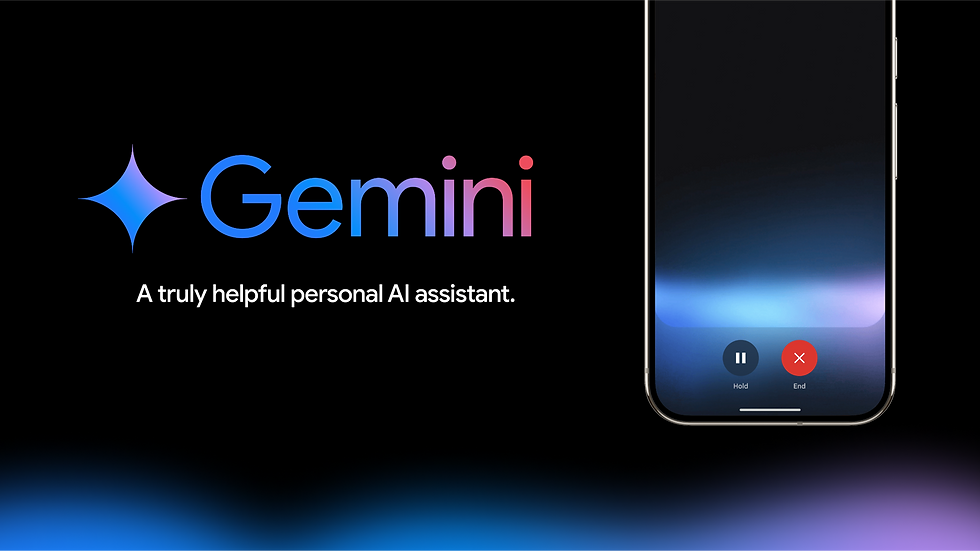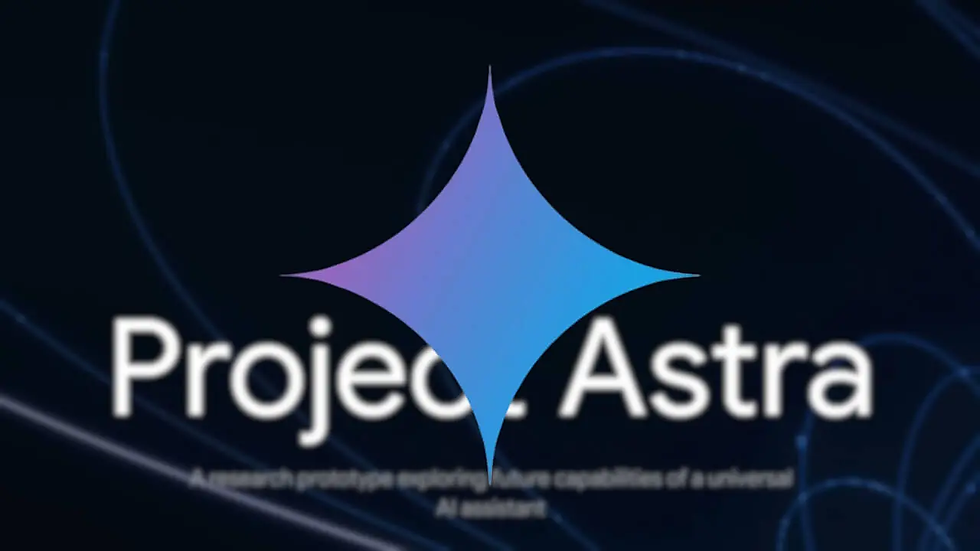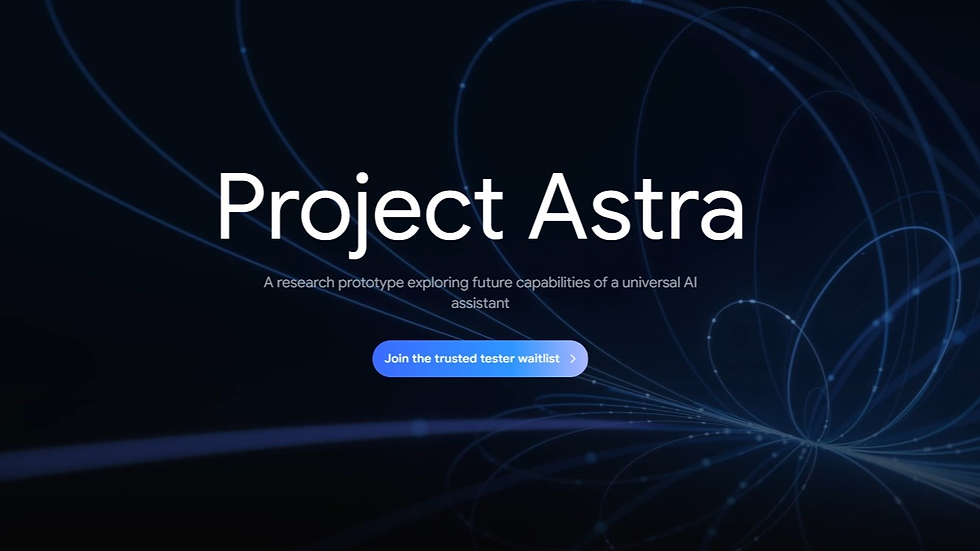From Gemini to Astra: Google’s Vision for a Proactive AI Assistant Future
- Ethan Carter

- Aug 18, 2025
- 12 min read
Updated: Aug 20, 2025

In today’s fast-evolving digital landscape, Google proactive AI assistant technology stands at the forefront of reshaping how users and enterprises interact with machines. This new generation of AI assistants moves beyond passive question-answering to actively anticipate needs, deliver multimodal insights, and seamlessly integrate across platforms. Google’s journey from Gemini, its current universal AI assistant, toward the ambitious Project Astra represents a strategic evolution aimed at creating a more proactive, capable, and trustworthy AI companion.
Gemini’s launch marked a significant milestone as Google introduced an assistant designed to understand and generate responses across text, images, audio, and video—ushering in a multimodal era of AI interaction. The transition to Astra promises even deeper conversational intelligence, broader enterprise embedding, and enhanced proactive behaviors tailored to user context. Why does this trajectory matter? For users, it means more personalized, efficient digital experiences; for enterprises, it unlocks new productivity gains and customer engagement channels; and for the AI industry, it signals a shift toward assistants that are both proactive and responsible.
This article explores Google’s proactive AI assistant journey from Gemini’s technical design and market impact to responsible AI governance and real-world use cases. It delves into the vision behind Project Astra and discusses the challenges and solutions shaping the future of these assistants. Insights are drawn from Google’s launch materials, academic research, industry reporting, and official policy documents to provide a comprehensive view of this evolving landscape.
Readers will gain practical understanding of Gemini’s multimodal architecture, security controls, market positioning, and governance frameworks, alongside actionable takeaways for adopting these technologies responsibly. Whether you are an enterprise decision-maker, developer, or tech enthusiast, this deep dive into Google’s AI assistant future offers clarity on what lies ahead.
Background: The Rise of Google Proactive AI Assistant — Gemini’s Launch and Evolution

Google’s foray into proactive AI assistance took a defining step with the public launch of Gemini, touted as a multimodal universal assistant capable of understanding and generating content across various media types. First introduced in late 2023, Gemini was positioned as an evolution beyond traditional assistants by combining state-of-the-art large language models (LLMs) with advanced image, audio, and video processing. This integration enables richer interactions that reflect real-world complexity.
The initial rollout showcased Gemini’s ability to handle complex dialogues with persistent memory features designed to personalize interactions over time. Early milestones included delivering improved conversational nuance and integrating with Google’s ecosystem services, such as Calendar and Drive, allowing the assistant to proactively suggest task reminders or content summaries.
Industry observers framed Gemini’s market entry as Google’s strategic move to regain ground against rivals like OpenAI’s ChatGPT and Microsoft-backed AI tools. According to Wired’s coverage of the Gemini 2 release, Google sought to close feature gaps by incorporating ChatGPT-style conversational abilities while leveraging its multimodal strengths to differentiate its offering. This positioning emphasized not only conversational fluency but also the assistant’s capability to interpret visual inputs—a key differentiator in the growing AI assistant market.
The evolution of Gemini reflects Google’s commitment to building a proactive AI assistant ecosystem that can serve diverse user needs—from casual queries to enterprise workflows. As Gemini continues updating its memory functions and multimodal capabilities, it sets the stage for the next generation of assistants under Project Astra.
Google Proactive AI Assistant Capabilities at Launch
Supports multimodal inputs: text, images, audio, and video.
Enables conversational memory, allowing context retention across sessions.
Integrates with Google services for task automation and proactive suggestions.
Offers visual understanding for image-to-text and video summarization tasks.
Provides natural language generation with nuanced responses tailored to user intent.
These features establish Gemini as a Google proactive AI assistant designed not just for reactive help but proactive engagement across modalities.
Market Reactions and Initial Adoption Signals for the Google Proactive AI Assistant
Analysts noted early adoption indicators highlighting Gemini’s potential in both consumer and enterprise markets. Wired reported that Gemini 2’s release closed critical gaps in conversational abilities compared to leading AI chatbots while maintaining strengths in multimodal understanding. Market reception praised Google’s emphasis on proactive behaviors—anticipating user needs rather than waiting for explicit prompts.
Initial deployment within Google Cloud services and beta programs attracted enterprise attention, signaling confidence in Gemini's scalability. However, some experts cautioned that competitive pressure from agile AI startups would require Google to accelerate feature rollouts. Nonetheless, early commentary underscored Gemini’s positioning as a foundational step toward embedding proactive AI assistants deeply into everyday workflows.
Google Proactive AI Assistant Technical Architecture and Multimodal Design

At the core of Gemini’s success lies its sophisticated technical architecture that enables seamless understanding and generation across multiple data types. The assistant employs a modular multimodal model pipeline that processes text, images, audio, and video inputs in parallel before fusing representations into a unified contextual understanding. This design supports complex tasks such as interpreting an image caption request alongside related textual queries or summarizing video content with accompanying dialogue.
According to recent arXiv research on Gemini’s architecture, the system integrates transformer-based encoders specialized for each modality. Cross-attention mechanisms then merge these representations at different layers to capture inter-modal correlations effectively. This approach yields superior performance on benchmarks requiring joint reasoning over visual and linguistic data compared to unimodal models.
Visual understanding capabilities have been particularly notable. A separate study detailed in arXiv highlights Gemini's ability to perform image-to-text tasks with high accuracy, such as generating detailed descriptions or extracting relevant information from complex scenes. This capability enables users to interact naturally with rich media within conversations.
How the Google Proactive AI Assistant Handles Multimodal Inputs
Gemini's pipeline begins by encoding each input type through specialized subnetworks:
Text inputs are tokenized and processed using transformer layers optimized for language modeling.
Images pass through convolutional backbones followed by transformer encoders that extract semantic features.
Audio inputs undergo signal processing before feature extraction via recurrent or transformer networks.
Video streams are analyzed frame-by-frame or via spatiotemporal encoders capturing motion patterns.
These modality-specific embeddings feed into a fusion layer applying cross-attention operations to integrate signals. For example, given an image query like “Describe this photo,” Gemini aligns visual features with probable textual descriptions generating natural language responses.
Trade-offs include balancing real-time responsiveness with computational costs—particularly for video processing—and maintaining accuracy across diverse contexts. Nonetheless, this multimodal design positions Gemini as a versatile assistant for diverse interaction modes.
Security and Instruction-Level Controls in the Google Proactive AI Assistant
Maintaining safety and ethical standards is paramount for a Google proactive AI assistant deployed at scale. Google integrates multiple layers of content filters and system instructions embedded within Gemini’s runtime environment to constrain outputs appropriately.
As detailed in Google Cloud's blog, content filters screen generated responses for harmful or disallowed material such as hate speech or sensitive data leaks. System instructions govern behavioral constraints—ensuring compliance with usage policies by guiding the model towards safe response boundaries during generation.
Runtime protection mechanisms include anomaly detection systems that flag unusual query patterns or outputs potentially indicative of misuse. Together, these controls form an adaptive safety net enabling trusted deployments across consumer-facing products and enterprise applications.
Research Benchmarks and Performance Signals for the Google Proactive AI Assistant
Gemini's performance has been rigorously evaluated against leading benchmarks spanning language understanding, image captioning, video summarization, and multimodal reasoning tasks. The arXiv technical paper reports that Gemini consistently outperforms prior models on multi-dataset evaluations measuring accuracy, coherence, and relevance.
Real-world capability implications include enhanced contextual awareness enabling more meaningful conversations and reduced error rates in interpreting complex multimodal inputs. These benchmarks affirm Gemini's position as a competitive Google proactive AI assistant ready for broad adoption in diverse domains.
Responsible AI and Governance for the Google Proactive AI Assistant

Google’s approach to responsible AI underpins Gemini’s design philosophy, reflecting the company’s published principles emphasizing fairness, privacy, transparency, and user control. These guidelines directly influence how Gemini behaves in interactions and how it is deployed across sectors.
Behavior standards codify expected assistant conduct—avoiding biased or harmful outputs while providing informative responses aligned with ethical norms. According to an Axios report, these standards form part of an automated moderation system supplemented by human oversight during early rollouts.
Behavior Standards Shaping the Google Proactive AI Assistant
Explicit behavior rules embedded in system instructions define allowed response types and guardrails against unsafe content generation. This includes avoiding politically sensitive topics without context, refraining from medical or legal advice beyond disclaimers, and promoting respectful communication.
These standards ensure that the Google proactive AI assistant delivers consistent and responsible output even when faced with ambiguous or adversarial queries—a vital feature to maintain user trust.
Memory, Privacy, and User Controls in the Google Proactive AI Assistant
A distinctive aspect of Gemini is its memory functionality that enables personalized experiences by recalling past interactions. However, this raises privacy concerns addressed through opt-out mechanisms allowing users to disable memory features selectively.
As covered by TechRadar, Google provides transparent settings where users can manage data retention preferences easily. Data minimization principles guide what information is stored, while audit logs track usage for compliance monitoring.
These controls exemplify a balanced approach—leveraging memory benefits without compromising user privacy or autonomy.
Enterprise Governance and Compliance for the Google Proactive AI Assistant
For organizations adopting Gemini models at scale, governance frameworks are critical to ensure regulatory compliance and ethical deployment. Google's responsible AI documentation recommends configurations such as:
Customizable content filters tailored to enterprise risk profiles.
System instruction adjustments reflecting organizational policies.
Regular audits assessing model outputs against compliance standards.
User access controls managing data visibility within teams.
Such measures empower IT and legal teams to safely implement a Google proactive AI assistant aligned with industry regulations like GDPR or HIPAA while maximizing operational value.
Market Adoption and Competitive Positioning of the Google Proactive AI Assistant

Google has strategically expanded Gemini’s reach through key commercial partnerships and distribution channels targeting both consumer markets and enterprise clients. A notable example is the Oracle-Google Cloud collaboration reported by Reuters enabling Oracle customers to access Gemini models natively within their cloud infrastructure—significantly broadening enterprise adoption potential.
Partnerships, Distribution Channels, and Enterprise Uptake of the Google Proactive AI Assistant
This Oracle deal exemplifies how Google leverages established cloud ecosystems to embed its proactive assistant capabilities deeply within enterprise workflows. Hosting on Oracle Cloud allows customers to meet stringent regulatory requirements while benefiting from Gemini's multimodal intelligence.
Such partnerships accelerate commercial deployments by combining vendor strengths: Google's leading-edge model development with Oracle's enterprise sales reach and compliance infrastructure.
Competitive Moves and Feature Parity Driving Google Proactive AI Assistant Updates
Google has aggressively closed functional gaps between Gemini and competitors like ChatGPT by incorporating ChatGPT-like conversational features including multi-turn dialogue management and plug-in integrations. According to Tom's Guide, these rapid updates demonstrate Google's commitment to maintaining feature parity while leveraging unique multimodal capabilities as differentiation.
This dynamic competitive environment pressures continuous innovation but also benefits end-users with richer assistant functionality across platforms.
Market Signals, Adoption Metrics, and Expert Commentary about the Google Proactive AI Assistant
The Financial Times analysis highlights robust user engagement metrics following Gemini's rollout—with increasing daily active users and expanding integration into productivity tools signaling strong market traction. Industry experts predict that Google's proactive assistant roadmap positions it well for sustained growth amid intensifying competition.
Real-world Use Cases and Case Studies for the Google Proactive AI Assistant

The versatility of a Google proactive AI assistant like Gemini is evident across consumer productivity enhancements, enterprise integrations, and creative professional workflows.
Consumer Productivity and Personalization with the Google Proactive AI Assistant
Leveraging persistent memory capabilities enables personalized scheduling assistance where the assistant learns user habits over time—automatically suggesting calendar adjustments or reminders based on past preferences. Multimodal search empowers users to upload images or voice commands alongside text queries for richer results.
According to TechRadar, these features translate into more efficient task automation and tailored digital experiences improving daily productivity.
Enterprise Embedding: Oracle Distribution and Platform Integrations for the Google Proactive AI Assistant
The Oracle-Google Cloud partnership illustrates a compelling enterprise use case where organizations embed Gemini directly within business applications—supporting customer service bots augmented by multimodal understanding or automating document analysis workflows.
This case study underscores how enterprise sales strategies combined with cloud hosting solutions enable scalable deployment respecting compliance mandates while driving operational efficiencies.
Multimodal Creative and Professional Workflows Using the Google Proactive AI Assistant
Creative professionals benefit from Gemini’s ability to analyze visual content alongside textual briefs—for instance, generating marketing copy informed by uploaded product images or assisting researchers in summarizing multimedia sources quickly.
As noted by Tom's Guide, such multimodal support enhances workflow speed and quality across domains including content creation, design review, customer support augmentation, and data analysis.
Project Astra and Google’s Future Vision for a Proactive AI Assistant

Building upon Gemini’s foundation, Project Astra embodies Google's vision for a next-generation proactive AI assistant characterized by deeper conversational intelligence, expanded multimodal scope including sensor data integration, and more anticipatory assistance behaviors tailored dynamically to context.
A Financial Times feature describes Astra as an evolution designed to embed seamlessly across devices and platforms—offering users intelligent guidance before explicit requests are made while ensuring scalability for diverse enterprise applications.
Differences Between Project Astra and the Current Google Proactive AI Assistant (Gemini)
While Gemini focuses on delivering universal multimodal assistance with foundational memory features, Astra aims to extend scope by:
Enabling more proactive behaviors, such as predicting user needs based on environmental cues.
Supporting larger-scale multimodal inputs, including live sensor data from IoT devices.
Integrating more tightly into enterprise ecosystems with advanced security certifications.
These enhancements mark Astra as not just an upgrade but a strategic leap toward anticipatory AI companions capable of complex decision support beyond current capabilities.
Business Strategy and Potential Market Impact of Project Astra as Google Proactive AI Assistant Evolution
From a commercial perspective, Astra could reshape platform competition by enabling differentiated service tiers featuring predictive insights that drive higher user engagement. Enterprise roadmaps may incorporate Astra-powered assistants deeply into workflows—accelerating automation of knowledge work while maintaining compliance safeguards.
Experts quoted in Financial Times anticipate Astra's rollout over the next few years will catalyze new partnership models extending beyond traditional cloud integrations into edge computing scenarios—broadening market reach significantly.
Challenges and Solutions for Deploying the Google Proactive AI Assistant

Despite its promise, deploying a Google proactive AI assistant like Gemini involves navigating several challenges spanning privacy concerns, security risks, regulatory compliance, and competitive pressures.
Privacy, Memory, and User Consent Challenges for the Google Proactive AI Assistant
User trust hinges on transparent memory management policies offering clear opt-in/out flows complemented by data minimization strategies—ensuring personal information is retained only when necessary. Providing audit logs enables organizations to verify compliance with privacy regulations effectively.
As TechRadar emphasizes, default privacy settings favor minimal retention unless expressly authorized by users—a best practice recommended in Google's responsible AI guidelines.
Security, Robustness, and Misuse Mitigation for the Google Proactive AI Assistant
Robust security measures include layered content filters blocking harmful outputs alongside system instructions steering model behavior proactively during runtime. Continuous monitoring paired with red-team testing identifies potential exploits or bias issues before deployment escalation.
Google Cloud blogs highlight these adaptive controls as essential tools enabling enterprises to safely harness Gemini capabilities without exposing systems or users to undue risk.
Competitive Dynamics and Staying Current with Google Proactive AI Assistant Updates
Given rapid innovation cycles in generative AI, organizations must track feature updates closely—balancing timely adoption against vendor lock-in risks. Maintaining feature parity strategies helps enterprises stay competitive by integrating new assistant capabilities such as ChatGPT-like functionalities promptly while managing operational stability effectively.
Recommendations from sources like Tom's Guide underscore agile governance paired with continuous evaluation as critical success factors in this evolving landscape.
Frequently Asked Questions about Google Proactive AI Assistant (FAQ)
Q1: What is the Google proactive AI assistant and how does it differ from Gemini? The Google proactive AI assistant refers broadly to Google's evolving class of intelligent assistants designed to anticipate user needs proactively across modalities. Gemini is Google's current universal multimodal assistant combining text, image, audio, and video understanding capabilities. Project Astra represents a future vision building upon Gemini with deeper proactivity and broader scope (Google DeepMind blog, Financial Times feature).
Q2: How does the Google proactive AI assistant handle my data and memory? The assistant uses memory features enabling personalized experiences but provides clear opt-out mechanisms so users control what data is retained. Responsible-AI policies enforce transparency about data use alongside privacy safeguards (TechRadar, Cloud documentation).
Q3: Can enterprises deploy the Google proactive AI assistant on their own cloud or through partners? Yes. Notably, an Oracle-Google Cloud partnership allows enterprises to run Gemini models within Oracle Cloud infrastructure meeting regulatory requirements while benefiting from Google's technology (Reuters).
Q4: What safety measures are built into the Google proactive AI assistant? Safety is ensured through layered content filters screening outputs for harmful content alongside system instructions guiding safe model behavior during interactions (Cloud blog).
Q5: When will Project Astra features be available and how do they affect users? Project Astra is expected to roll out over coming years introducing more anticipatory assistance features integrated across devices with enhanced multimodal capabilities—potentially transforming user experiences through proactive guidance (Financial Times feature).
Conclusion: Trends & Opportunities for Adopting a Google Proactive AI Assistant

Gemini currently offers robust multimodal understanding combined with conversational memory, positioning it as a powerful tool across consumer productivity and enterprise applications. Looking forward, Project Astra promises transformative advances in proactivity and contextual awareness that could redefine digital assistance paradigms globally.
Organizations interested in adopting these technologies should consider piloting initiatives emphasizing:
Clear governance frameworks aligned with responsible-AI principles.
Privacy-first configurations including memory opt-outs.
Continuous monitoring leveraging built-in content filters.
Strategic partnerships leveraging cloud distribution channels like Oracle Cloud.
Staying informed on rapid feature updates maintaining competitive parity.
Balancing innovation with safety will be pivotal as these assistants evolve; robust frameworks today enable sustainable scaling tomorrow.
Watching trends around memory policy refinements, multimodal improvements, and Astra rollouts will offer early signals on market directions. Embracing this trajectory positions users and enterprises alike at the forefront of an increasingly proactive digital future driven by Google's vision of intelligent assistance evolving from Gemini toward Astra.
By integrating technical sophistication with thoughtful governance, Google's proactive AI assistants exemplify how advanced technology can enhance human productivity while respecting privacy and ethics—a blueprint likely shaping the future of human-computer collaboration worldwide.

